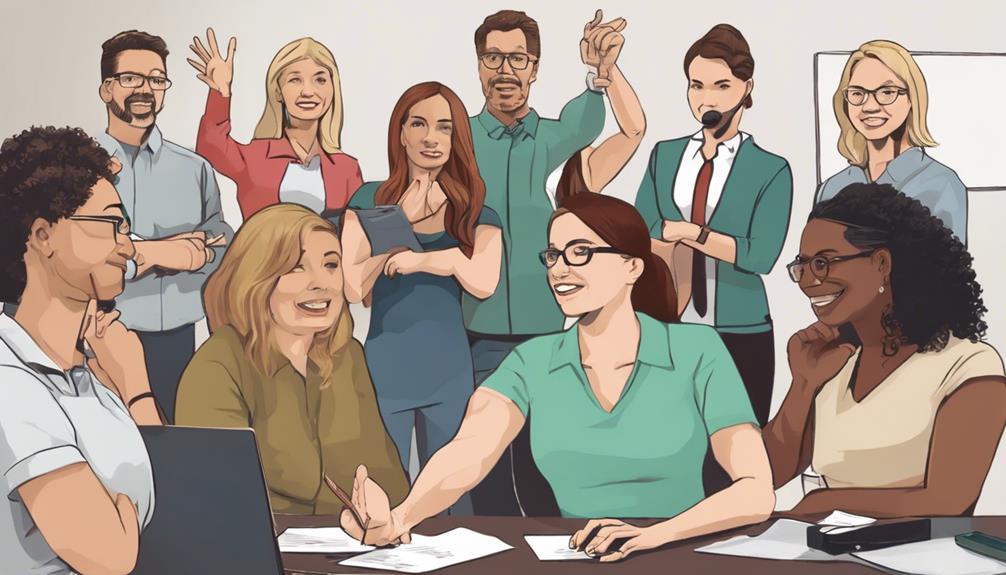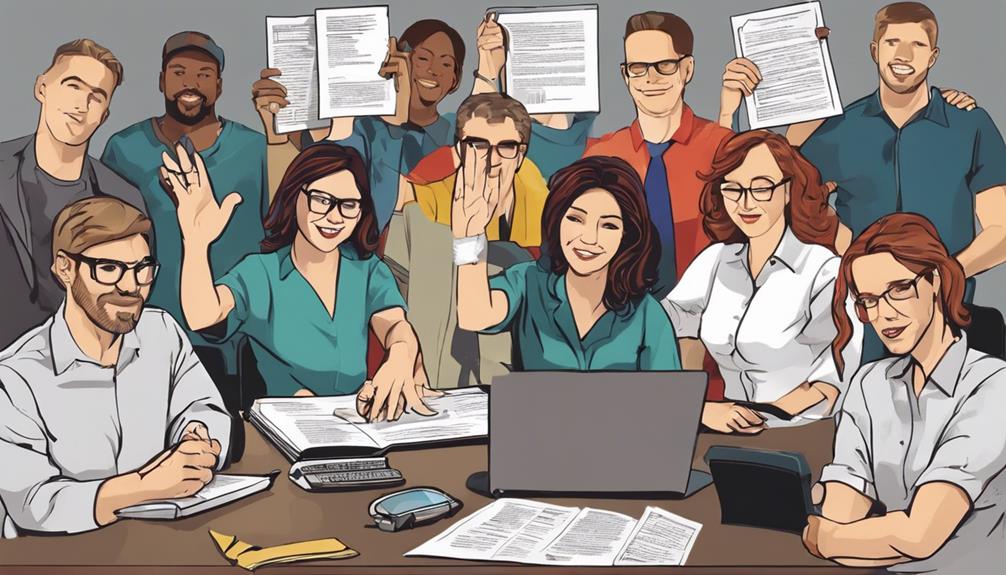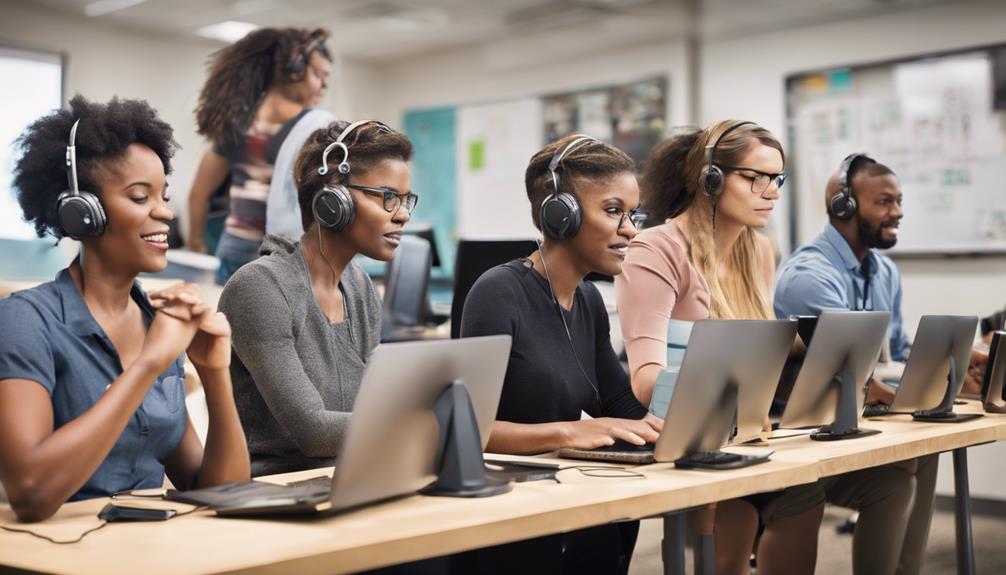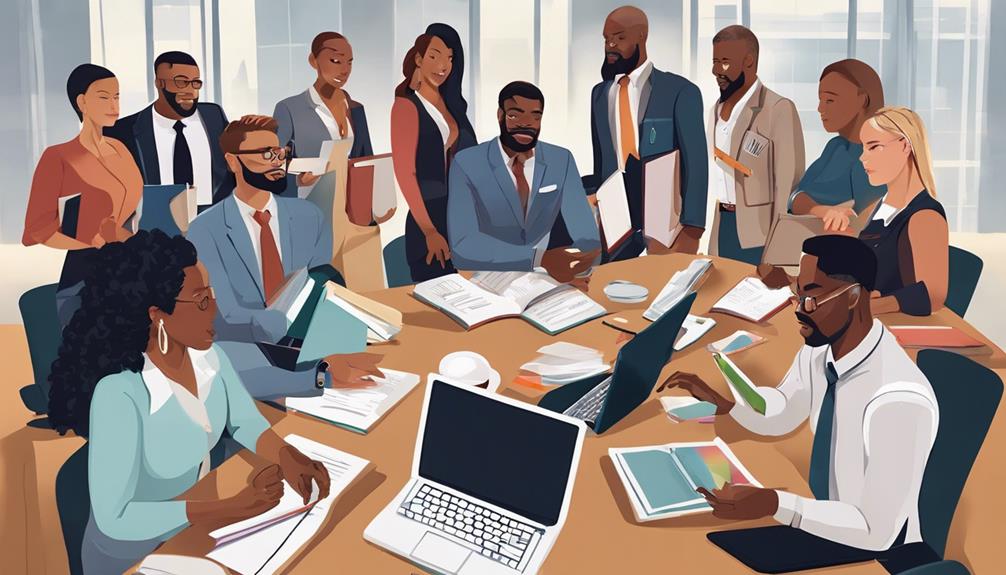As we journey through the complex routes of professional growth in the field of deaf education, imagine a scenery where skills flourish like colorful flowers in a garden. These certification programs are more than just qualifications; they serve as entrances to a realm of specialized knowledge and opportunities ready to be discovered.
Each program holds a key to unlocking new possibilities and honing skills essential for impactful engagement with the deaf and hard of hearing community. Let's embark on a journey through these certification programs, each offering a unique perspective and a chance to grow in our understanding and practice.
Key Takeaways
- Teacher certification programs require completion of specialized education and exams like TASC for Texas teachers.
- Counseling certification enhances mental health support with cultural competency training for diverse career paths.
- Legal programs focus on advocacy skills for deaf individuals and compliance with laws for equal opportunities.
- Interpreter certification ensures up-to-date skills in American Sign Language and Last Resort Communication Services.
Teacher Certification Programs
When pursuing teacher certification programs for deaf and hard of hearing professionals in Texas, completion of an educator preparation program or alternative certification program is required. This ensures that educators are equipped with the necessary skills and knowledge to support the unique needs of deaf and hard of hearing students.
Special Education Certification is crucial for teachers at the Texas School for the Deaf, alongside Deaf Hard of Hearing Certification. Passing exams like the TASC exam is mandatory for teachers working with deaf students in Texas, while bilingually certified teachers must also pass the TASC-ASL exam.
The certification process for Special Education involves specific exams such as TExES 161 Special Education EC-12 and TExES 160 PPR EC-12. By completing these programs and certifications, educators can better cater to the diverse needs of deaf and hard of hearing students, creating inclusive and supportive learning environments.
Counseling Certification Programs

We understand the importance of specialized counseling techniques tailored to the unique needs of the deaf and hard of hearing community. These programs not only provide valuable career opportunities in counseling but also equip professionals with the skills to effectively support individuals facing mental health challenges.
Specialized Counseling Techniques
Specialized counseling techniques certification programs empower professionals with the skills to effectively support deaf and hard of hearing individuals in diverse counseling settings. These programs focus on communication strategies, cultural competency, and understanding the unique needs of the deaf and hard of hearing community.
By obtaining certification in specialized counseling techniques, professionals enhance their ability to provide tailored mental health support and guidance to deaf and hard of hearing clients. Training encompasses addressing mental health challenges, facilitating communication, and promoting emotional well-being within this population.
Graduates are prepared to deliver culturally sensitive and effective counseling services, promoting mental health and overall well-being among deaf and hard of hearing individuals. Such programs play a crucial role in bridging gaps in deaf education and mental health support.
Career Opportunities in Counseling
Transitioning from specialized counseling techniques, counseling certification programs open doors to diverse career opportunities for professionals looking to support deaf and hard of hearing individuals in various counseling roles.
- Diverse Career Paths: Graduates can work as mental health counselors, school counselors, or rehabilitation counselors specializing in the deaf community.
- Enhanced Job Prospects: Certification in counseling for the deaf and hard of hearing can boost employment opportunities.
- Specialized Skills: Programs provide unique training in communication strategies and cultural considerations for supporting individuals with hearing loss.
- Tailored Coursework: Topics include deaf culture, mental health issues within the deaf community, and effective counseling strategies.
- Impactful Support: Professionals gain the skills needed to make a meaningful difference in the lives of deaf and hard of hearing individuals.
Healthcare Certification Programs
Healthcare certification programs for deaf and hard of hearing professionals provide specialized training in medical terminology, patient communication, and cultural competency. These programs focus on equipping individuals with the skills needed to offer inclusive and quality care. These education programs are designed to meet the unique needs of deaf students, emphasizing effective communication strategies and cultural understanding within healthcare settings.
By offering tailored coursework, these programs support professional development by preparing graduates to bridge the gap in healthcare disparities for the deaf and hard of hearing community. Individuals completing these certification programs can pursue diverse career paths such as healthcare interpreters, patient advocates, or specialized healthcare providers.
Legal Certification Programs

In legal certification programs for deaf and hard of hearing professionals, we delve into the intricate web of laws and regulations that profoundly impact this community. These programs are essential for individuals seeking to navigate the complex legal landscape surrounding deaf education, accessibility, and the rights of deaf individuals.
Here are five key aspects of legal certification programs for deaf and hard of hearing professionals:
- Education Focus: Legal certification programs emphasize the importance of understanding legal frameworks related to deaf education.
- Advocacy Skills: Participants learn how to effectively advocate for the rights of deaf and hard of hearing individuals within the legal system.
- Compliance Knowledge: Professionals gain insight into legal requirements and protections, ensuring they can operate within the bounds of the law.
- Equal Access Promotion: Certification programs equip individuals with the knowledge to promote equal access and opportunities for the deaf and hard of hearing population.
- Navigating Challenges: Participants are prepared to navigate legal challenges that may arise in their work and uphold the rights of the community.
Sign Language Interpretation Certification Programs

Sign language interpretation certification programs play a crucial role in equipping individuals with the necessary skills to effectively communicate with the deaf and hard of hearing community. In Texas, these programs are overseen by the Board for Evaluation of Interpreters. They offer Continuing Education Units (CEUs) for interpreter certification maintenance, ensuring that professionals stay up-to-date with the latest practices.
Last Resort Communication Services are also available within these programs to address essential communication needs. Resource Specialists provide tailored services, including a Senior Citizens Program catering to older individuals who may require specialized support. These interpreter training programs focus on developing skills in American Sign Language and other communication methods to meet the diverse needs of the deaf and hard of hearing population.
Technology Certification Programs

We've compiled some key points to guide you through technology certification programs tailored for deaf and hard of hearing professionals.
Discover the latest tech innovations, get hands-on training opportunities, and gain expertise in industry-specific software applications.
These programs are designed to empower you with the necessary skills to excel in supporting deaf individuals in various environments.
Latest Tech Innovations
Exploring the latest advancements in technology certification programs for deaf and hard of hearing professionals reveals a dynamic landscape of tools and skills designed to enhance communication accessibility.
- Integration of AI for real-time transcription services
- Development of gesture recognition technology for improved communication
- Implementation of virtual reality for immersive sign language learning
- Adoption of mobile applications for remote communication support
- Utilization of cloud-based platforms for seamless collaboration
These innovations not only empower professionals to navigate the evolving technological landscape but also ensure that individuals with hearing impairments receive the best possible support. Stay updated with these cutting-edge tools to enhance your communication accessibility skills and better serve the deaf and hard of hearing community.
Hands-On Training Opportunities
Hands-On Training Opportunities in technology certification programs equip professionals with practical skills to enhance communication and accessibility for the deaf and hard of hearing community. These programs, often offered through an education service center, focus on providing participants with foundational knowledge in utilizing technology to support deaf and hard of hearing individuals effectively.
Participants learn to implement and troubleshoot various assistive technologies like video relay services, captioning software, and communication devices. By completing the certification program, individuals gain the necessary expertise to seamlessly integrate technology into educational and professional settings, ultimately improving the overall experience for the deaf and hard of hearing population.
This hands-on training ensures that graduates are well-prepared to make a positive impact in their work with the community.
Industry-Specific Software Expertise
In our pursuit of equipping professionals with the necessary expertise to support the deaf and hard of hearing community, we now shift our focus to Industry-Specific Software Expertise within Technology Certification Programs.
- Specialized software programs cater to the unique needs of the hard of hearing.
- Certification ensures proficiency in enhancing communication and accessibility for the hearing impaired.
- Training equips professionals in effectively supporting deaf individuals through technology.
- Industry-specific software expertise enhances service delivery in Texas and beyond.
- Professionals gain skills to leverage software for improved accessibility in hard of hearing settings.
Business Administration Certification Programs

When pursuing a Business Administration certification program as a deaf or hard of hearing professional, one can expect to delve into areas such as management, finance, and strategic planning. These programs, whether at a School for the Deaf or an institution outside of Texas, offer specialized coursework catering to the unique needs of individuals in business settings. Through this certification, one gains valuable skills in leadership, operations, and organizational development, essential for success in various industries.
This experience working in a program tailored for deaf and hard of hearing individuals equips professionals with knowledge in business ethics, marketing, and decision-making processes specific to their communities.
Upon completion, graduates are prepared to embark on diverse career paths, including roles in finance, healthcare, and non-profit organizations. The Business Administration certification not only opens doors to new opportunities but also fosters a deeper understanding of how to navigate the business world effectively.
Frequently Asked Questions
What Is a CED Certification?
A CED Certification signifies a high level of expertise in audiology and speech-language pathology. It's a nationally recognized credential provided by the American Speech-Language-Hearing Association (ASHA).
Professionals with a CED Certification have met rigorous standards set by ASHA, demonstrating their proficiency in delivering audiology and speech-language services. This certification validates their skills and knowledge in the field, ensuring quality care for individuals with hearing and communication disorders.
What Are the 3 Options for Deaf to Be Educated?
When it comes to educating the deaf, there are several options available. Mainstream schools with support services, schools for the deaf, and bilingual/bicultural programs are three common choices. Each option caters to the unique needs of individuals based on factors like communication preferences and academic aspirations.
Deciding on the best educational setting depends on what works best for each person.
What Is a CED in Education?
A CED in education refers to a Certificate of Clinical Competence in Audiology from ASHA. It's a prestigious credential showcasing expertise in audiology.
Audiologists with a CED can diagnose, treat, and manage hearing and balance disorders. To earn a CED, audiologists must complete a graduate degree, pass a national exam, and finish a supervised fellowship.
Holding a CED signals high professional competence and commitment to ethical standards in audiology practice.
What Is a Deaf Education Degree?
Deaf Education degrees delve deeply into instructional strategies, language acquisition, and communication approaches for deaf and hard of hearing students. These programs equip professionals with specialized skills to support diverse learners effectively.
Graduates typically need to obtain a Texas Deaf and Hard of Hearing teaching certificate. Various Texas teacher preparation programs offer tailored degrees aligning with different language development philosophies.
Requirements include completing an Educator Preparation Program, passing certification exams, and submitting state applications.
Conclusion
In conclusion, these certification programs are like a toolbox full of tools ready to help us build a brighter future for deaf and hard of hearing individuals. With the right training and expertise, we can shape a world where everyone has equal access to education, support, and opportunities.
Let's continue to learn, grow, and advocate for inclusivity in all aspects of deaf education. Together, we can make a difference.











